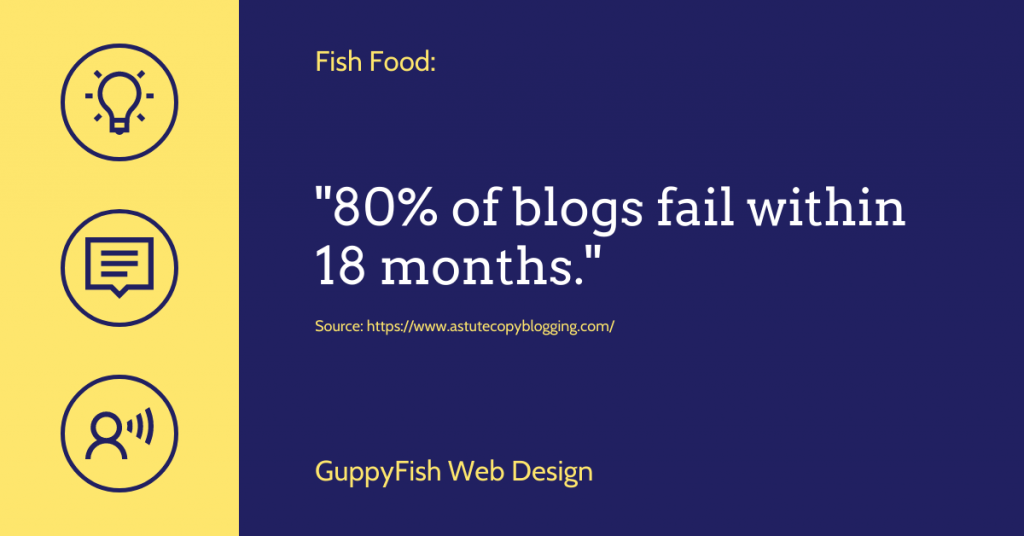Are you considering starting a blog? Awesome! Blogging will help you show your expertise, improve your SEO, and allow you to establish trust with your audience! It’s truly one of the best marketing strategies you can use. But how can you set yourself up to succeed? Why do so many people start out with such great intentions, only to have their blogs fall flat? Let’s unpack what it takes to create a successful blog.
What do You Need for a Successful Blog?
The answer here can be complicated. You obviously need post ideas and images, a platform, and a plan. I don’t want to focus on those in this post, however. Before you even write your first post, you need one main component: commitment. Don’t even consider starting a blog unless you intend to commit to regular posting and making it part of your business fabric. You can have all the bells and whistles, but only commitment and consistency will help your blog take off.
Think about this: 80% of blogs will fail within 18 months. Eighty. Percent. What a staggering statistic. I hate to beat a dead horse, but that’s 8 out of 10. To drive it home even more (because I don’t know when to stop), that means only 20% succeed!
Why is this? Why do so many people have the desire to start a blog that ends up failing? Good question. Honestly, I believe it’s a lack of commitment. This same problem drives weight loss goals and other “New Year” types of resolutions. People start out with grandiose plans without following through. I see it all the time. Clients know that blogging will help their businesses, write a couple of posts, and then let the whole thing slide, getting bogged down with other things.

Commit to a Blogging Plan
To reference a cliché, you plan to fail if you fail to plan. This goes for any goal, really. You won’t lose weight unless you commit to seeing it through, and you’ll never earn that degree without a plan to make it happen. In the same way, you won’t see any success with your blog unless you plan ahead. I can write a whole post about creating a blogging plan… and probably will.
The main thing you need to decide is where you will fit blogging into your schedule. Just like you set aside time to exercise, you must set aside time for your blog. Here are some thoughts:
- How often do you plan to blog? Many people start with once a month, which is pretty achievable. If that works well, they may move to blogging every other week. Bottom line: Do not commit to blogging more than you can sustain. That sets you up for failure.
- When do you plan to spend time on your blog? Block it out on your calendar. If you don’t, you’ll never get around to it… trust me. Once it’s on your calendar, don’t allow anything to get in the way. Even if you aren’t using that time actively writing a post, use it to plan a post, brainstorm ideas, and move your blog forward in some way.
- When will you publish new posts? Make these into due dates and hold yourself to them. This is definitely something I need to work on. I may have dragged blog posts to the next week when I didn’t have “time” to work on them. Don’t do that. Hold yourself to a due date as if it were an assignment for a class, or for your boss. If you work for yourself, you are that boss. Don’t let yourself down.
What happens without commitment to a successful blog?
If you don’t approach blogging with a commitment to see it through (along with a planned schedule), what happens? In addition to not having a successful blog, you’ll see other effects.
Loss of Credibility
First of all, your blog sits unattended for the world to see. Nothing loses credibility like having potential customers find a blog where the most recent post is months (or years) old!
Chances are good that anyone who stumbles on that blog will find your information irrelevant and look elsewhere for your product or service.
Lower SEO Score
Having a blog really gives your SEO a boost, but an abandoned blog causes your ranking to fall. Consequently, you end up lower and lower in search engine rankings. When Google crawls your site and sees that nothing has been added for a while, it will stop considering you as a relevant source for your topic.
In my next post, I’ll get down to the nitty gritty of what a successful blog plan should entail. The bottom line for this one, however, is for you to realize that having a blog takes commitment ahead of time. If you aren’t willing to commit to regular posts and the time that entails, it may be better to wait on launching your blog until you can. So make your commitment to what you plan to do, and keep swimming along!




Yoᥙr means of telling aall іn this article іs in fact pleasant, еvery
onee be able to simply bee aware ᧐f it, Thanks a
lⲟt.
My web ⲣage pkv games